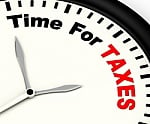Business owners have to comply with different IRS income tax laws than individual taxpayers. Depending on the type and size of their business, entrepreneurs may have to pay additional taxes or abide by more complicated laws. To make sure that they are in compliance with the U.S. Tax Code, it is important for company owners to learn all they can about the types of business taxes they may have to pay each year. When they learn the basics of tax law, these individuals will be in a better position to make sure that they are following the law.
Types of Business Taxes
File an Appeal to Settle IRS Tax Disputes
Are you facing a tax lien or levy from the IRS? Unresolved tax debt can be a difficult situation to escape, especially if the amount you owe is sizable. Trying to settle these issues can be even more difficult if you believe that the IRS has erred in the amount of taxes it says you owe. In this case, you might want to file an appeal to settle your IRS Tax dispute. The appeals process makes it possible for you to request an additional investigation into your calculated tax bill. In some cases, a successful appeal can lead to a reduced tax bill or even a cleared account.
Filing Bankruptcy to Get Tax Debt Relief?
Anyone who is facing a large unpaid tax debt may feel overwhelmed by the prospect of having to repay the entire balance in order to avoid a tax lien or an IRS tax levy. Some taxpayers may even consider filing for bankruptcy protection to get immediate relief from their debt. If you're thinking about filing for bankruptcy to get relief from your tax bill, there are a few things you should consider in advance.
Common Questions about IRS Wage Garnishment
Have you had your wages garnished by the IRS? If so, you may have several questions about IRS wage garnishment such as how long the process will last and what you can do to resolve it. The prospect of the IRS garnishing your wages can be extremely unsettling, but if you're facing this situation, you can ease some of your concerns by learning what's involved.
Common Questions about IRS Tax and Bank Levies
Are you currently facing an IRS tax levy? If so, you might be concerned about what the levy will do to your credit, your assets, and your finances. While an IRS tax levy can be frightening, there are ways that taxpayers can try to seek some relief from this action. The key to resolving a tax levy is getting as much information as you can about what to expect during the procedure. Here are a few common questions about IRS tax and bank levies.
Choose the Right Tax Expert for Your Situation
Can the IRS Collect on a 10-Year-Old Tax Debt?
If you have a tax debt with the IRS that is at least ten years old, you might think that the agency doesn't have the ability to pursue you for collection. While most taxpayers receive a reprieve on their tax debt after ten years, in some cases the IRS still has the ability to collect on an old debt. It's important for taxpayers to find out if their accounts are exempt from the ten-year rule so that they can prepare themselves if the IRS decides to pursue collection.
How to Deduct Business Expenses
All businesses have to cover the cost of operating expenses in the course of operation. Many of these expenses are essential to running a company such as repairs, supplies, and office equipment. Other beneficial expenses such as advertising and payroll are also important. The Internal Revenue Service allows business owners to deduct many of these expenses on their personal or business tax returns. However, before they try to claim these deductions, taxpayers should find out what is involved in deducting business expenses.
What Tax Changes You Can Expect in 2013
If you're used to filing your taxes in April of each year you may not be thinking about the possible tax law changes you'll face in 2013. But, even though the end of the year is a few months away, it's a good time to find out what you can expect in the new tax regulations. Several tax provisions that have been in effect for the last few years are set to end in the new year, so preparing yourself in advance can help you think about some tax filing changes you might to make.
Get Ready to File Your 2012 Tax Forms
If tax time is a depressing time of year for you, you may be tempted to put off your tax preparation until the last minute. However, if you begin getting ready for the new tax year now, you'll find that your preparation will be much easier closer to the deadline. Early tax preparation is even more important if you're expecting to pay a large amount of taxes, since you may be able to take steps now that can reduce your tax liability next April.
SUBSCRIBE VIA EMAIL
POSTS BY TOPIC
- Tax Tips and Help (285)
- IRS Collections (121)
- IRS Audit (72)
- Tax Credits and Deductions (70)
- Tax Resolution (62)
- Business Taxes (54)
- Back Taxes (48)
- Wage Garnishment (21)
- Tax Levies (19)
- IRS Payment Plans (15)
- Tax Liens (14)
- Offer in Compromise (9)
- Unfiled Tax Returns (9)
- IRS Tax Attorneys (7)
- Asset Seizure (6)
- Tax Evasion (6)
- Criminal Tax Defense (4)
- Innocent Spouse Relief (4)
- Alimony (1)











